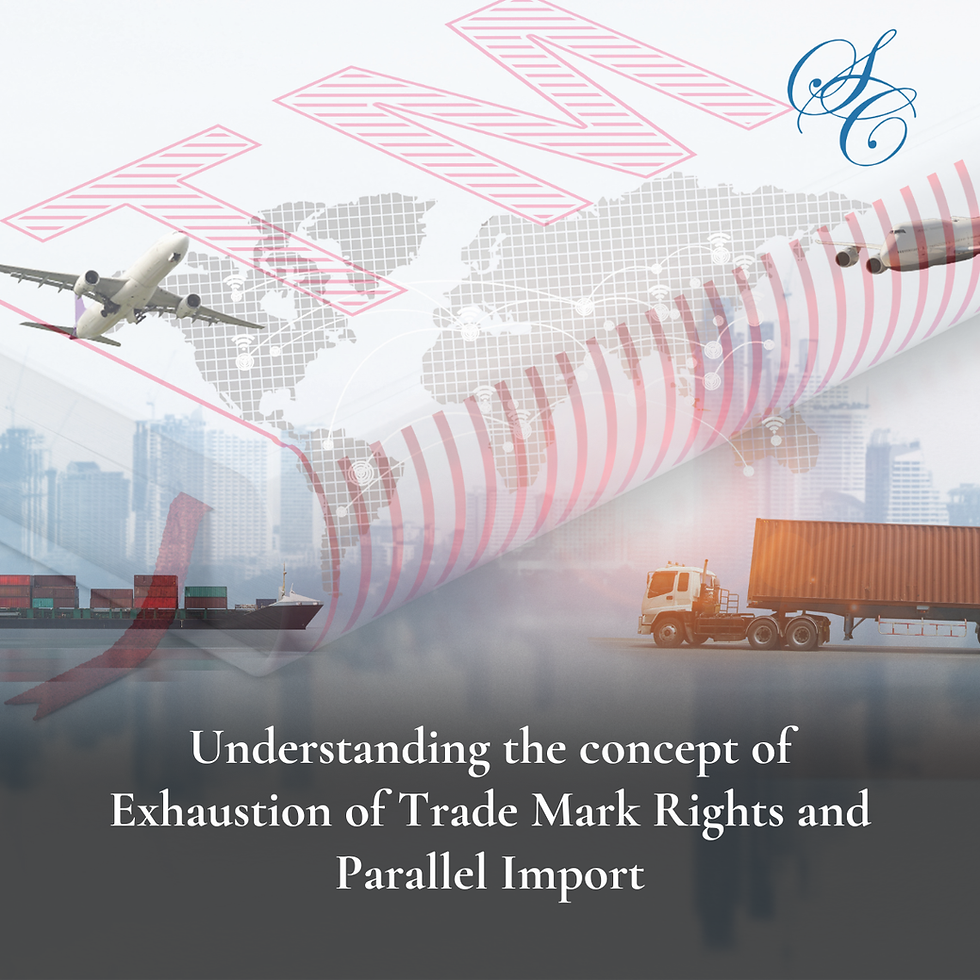Trade secrets: A Comparative Perspective of Their Protection and Enforcement
- Avilash Kumbhar
- Apr 17, 2023
- 5 min read
Trade secrets are information about a trade or business that is known only to a small number of people and has an economic value. They can take the shape of a formula, technical know-how, or a unique business approach, recipes, processes, software codes, customer lists, supply channels, or financial data. Trade secrets are information that can cause harm if exposed to a competitor. They can include technical data such as blueprints, computer programs, manufacturing process data, and commercial specifics such as client databases, advertising tactics, and delivery systems. Trade secrets are tools which support and incentivize the innovation of a business, lay a foundation for contracts, such as the Non-Disclosure Agreements (NDA) and employment contracts and protect the market strategies of a business. Misappropriation of Trade secrets happens when it is obtained through the abuse of confidential information or improper means of accession.
Trade secrets have become an important Intellectual Property (IP) for businesses in gaining competitive advantage. Today, businesses are increasingly seeking the worldwide market, and trade secret protection is an important aspect in strategizing such expansion. Additionally, firms have gone digital and are investing in Research & Development to incorporate AI into regular business processes. With these developments in mind, we try to decipher the legal position of trade secret protection in India, examine whether the existing legal position is well equipped to protect Trade secrets and/or remedy their breach, and determine whether there is a need for a harmonized law across jurisdictions to protect Trade secrets.
Existing Legal Position: Trade-Related Aspects of Intellectual Property Rights (TRIPS)[1], which came into force in 1995 to establish minimum standards for the regulation of IP by national governments, also laid down the foundation of the Trade Secret which protects ‘undisclosed information’[2] against unfair competition.
The United States of America was the first country to codify trade secret protection under the Uniform Trade Secret Act, 1979 (UTSA)[3]. UTSA is relevant to this discussion because the provisions of trade secret protection under TRIPS are borrowed from UTSA. For instance, UTSA defines trade secret as information that derives independent economic value from not being known to other people and is the subject of reasonable efforts to maintain its secrecy. Likewise, Article 39 of TRIPS requires that such information is secret, has commercial value, and reasonable steps have been taken to keep it a secret. UTSA also defined improper means and misappropriation in the context of trade secret protection and offers remedies such as injunctive relief and damages in case of any misappropriation of Trade Secret.
Now coming to India, while India has joined TRIPS on 1st January 1995, but is yet to have a codified law on Trade Secret which is until now governed by provisions laid down under the Contract Act, 1872, through legally binding Non-Disclosure Agreements to prevent any disclosure of confidential information, through contractual obligation. The closest India came to codify Trade Secret protection was when the Draft National Innovation Bill, 2008, was proposed, however, it has been more than 14 years, but we have no real progress in this domain. Trade secrets are more or less contractual in nature.
Judicial Pronouncements: Considering the murky nature of laws surrounding trade secret, it is imperative to lay our focus on the judicial pronouncements surrounding Trade Secret Law both in world as well as India.
In early America, legal precedents were already being made with regards to Trade secrets. In the 1837 case of Vickery vs Welch[4] the court held the defendant responsible for breach of contract and misappropriation of Trade secrets. Welch was a chocolatier who had perfected a method for making chocolate but decided to pass on his knowledge to others. Vickery objected, believing he had paid for the exclusive right to use Welch’s secret practices. The court found for Vickery, ruling that Welch had breached the sales contract and defeated the purpose of the deal by not maintaining the secret of his methods.
With respect to Confidentiality of Trade Secret both foreign jurisdictions and India have made major strides. The Delhi High Court, in the case of John Richard Brady v. Chemical Process Equipments Private Limited[5], relied on the case of Saltman Engineering Company Limited v. Campbell Engineering Company Limited[6] and held that the law on this subject does not depend on any implied contract, but rather on the broad principles of equity that who has received information in confidence shall not take unfair advantage of it. The court found it in the interest of justice to restrain the defendants from abusing the know-how, specifications, drawings and other technical information regarding the plaintiff’s machine, which was entrusted to them under express condition of strict confidentiality.
Fairfest Ltd vs ITE Group Plc & Ors[7] discussed the importance of executing an NDA. The petitioner, a company engaged in the business of organizing travel shows, entered into an NDA for a period of six months with the respondent in anticipation of entering into a Joint Venturing Agreement at a later date. The respondent was supposed to maintain the confidentiality of the information received by him for two years after the termination of the NDA. The High Court, enforcing the secrecy clause in the NDA, held that all this information was Trade secrets and passed an injunction restraining the respondent from sharing any information protected under the Agreement.
Trade secrets, like any other form of IP, requires such information to be unique and novel to statutorily protected. On this the most recent US District Court case of CODA DEVELOPMENT vs GOODYEAR TIRE & RUBBER COMPANY and ROBERT BENEDICT[8] becomes relevant. US District Court, in this case, reversed the Jury Verdict which initially concluded that Goodyear willfully and maliciously misappropriated five out of twelve Trade secrets. The Court noted that four of the five Trade secrets were too vague to be protected and the fifth was “no secret at all” because the concept was not new in 2009.
Recent Development Surrounding Trade secrets: The most important details in this domain are the importance of intention and the requirement to regulate use of AI at workplace under employment-based agreements. With the technical advancement and digitization, comes the internet offense such as phishing emails. The recipients of such emails often end up sharing confidential proprietary data by accessing such spam emails. Hence, study of the disclosing party’s true intention in such disclosure i.e., whether such disclosure was willful, also becomes relevant. As reported by multiple media houses[9], in Financial Express April 7, 2023, Samsung Engineers unintentionally leaked confidential data, including source code and internal meeting notes, while using the famous AI chatbot ChatGPT, to help them with their tasks. ChatGPT relies on input data this important piece of information now vests with OpenAI, creators of ChatGPT. This instance highlights the importance of intention and the requirement to regulate use of AI at workplace under employment-based agreements. While the Italian Government reportedly agreed to lift ban on ChatGPT, if the latter agrees to the Italian Govt’s terms, it would be interesting to see how the future of Trade Secret turns out in an AI influenced workplace.
Conclusion
Trade Secret as a law is very well established in the United States but the same is not discussed much about in India. In today’s time the world has seen a shift in the way the businesses are conducted and Intellectual Property being the key revenue model of these businesses it is essential that the companies keep in mind the importance of Trade secrets and how the new technology of Artificial Intelligence can help the businesses grow meanwhile protecting the Trade secrets which is crucial to them. With the growing dependency on AI based tools it is high time India comes up with a Trade Secret law in order to adjudicate on the matters pertaining to Trade Secret misappropriation.
[1] Accessible at https://www.wto.org/english/docs_e/legal_e/31bis_trips_e.pdf [2] Art. 39, Trade-Related Aspects of Intellectual Property Rights (TRIPS), accessible at https://www.wto.org/english/docs_e/legal_e/27-trips_04d_e.htm [3] Accessible at https://www.wipo.int/edocs/lexdocs/laws/en/us/us034en.pdf [4] 36 Mass. 523, 19 Pick. 523 [5] AIR 1987 Delhi 372 [6] (1948) 65 RPC 203 [7] 2015(2) CHN (CAL) 704 [8] CASE NO. 5:15-cv-1572 [9] Priya Pathak, ‘Samsung’s trade secrets have reportedly leaked because employees shared a bit too much info with ChatGPT’, Financial Express, April 7, 2023.




Comments